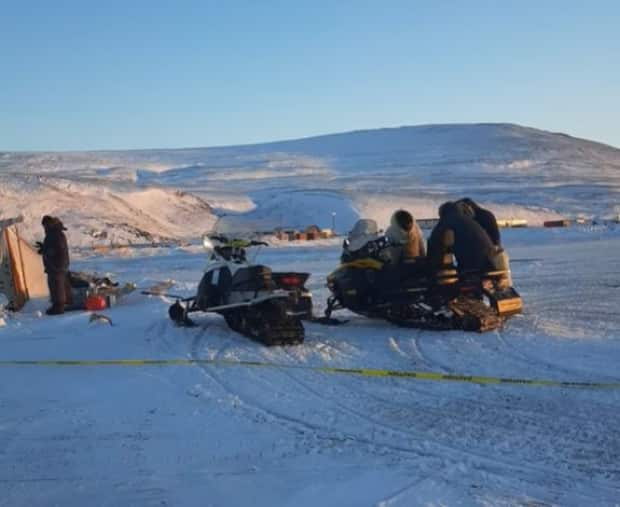Nunavut court grants mining company injunction against blockade protesters

A Nunavut judge has granted Baffinland Iron Mines an injunction against a group of protesters who blockaded the Mary River mine airstrip and trucking road for a week in February.
The court injunction bans protesters, and anyone else who knows about the injunction, from obstructing land used by the mine, especially the airstrip and trucking road.
While the blockade is over, the company wanted the injunction to make sure it doesn't happen again.
"While the defendants have left the project site, their counsel was not able to confirm that they have agreed to not return and continue the protest," Justice Susan Cooper said in a decision released March 3 by the Nunavut Court of Justice.
The blockade started on Feb. 4. It led to a shut down of all operations at Mary River. In court documents, mine officials said it cost the company $14 million.
Baffinland accused the small group of protesters of trespassing, unlawful interference with economic interests, and mischief.
The protest was over damage to the environment from mining, which demonstrators said could get worse if the company is approved to double production at Mary River. That expansion is currently under an environmental review required by the territory's land claim, the Nunavut Agreement.
The RCMP can enforce this injunction order by removing tents or sleds from the mine site, or detaining anyone who knowingly breaches the order. Land around the mine can still be used for activities like hunting.
Judge says protest could happen again
The mine is located on northern Baffin Island, around 160 kilometres from the community of Pond Inlet.
While protesters said they would let planes out for medical needs or to change staff, Cooper imposed a temporary court order Feb. 10 to make sure over 700 staff at the mine could leave.
When that order was made, the protesters left the mine. Their lawyer says it shows they were law abiding.
But the blockade also ended because Inuit leaders promised to meet in person with the protesters to talk about their environmental concerns.

Nunavut Impact Review Board hearings about potential environmental or socioeconomic impacts were happening in Pond Inlet and Iqaluit when the protest started.
"If the defendants are not satisfied with their meetings with Inuit leadership, the continued process of the [Nunavut Impact Review Board] hearings, or any other aspect of the mine project, there is a real possibility that the protest will continue," Cooper wrote.
Cooper said the injunction doesn't stop people from protesting.
"There are other locations within the territory where a protest would be seen and heard," she said.
The injunction granted is called an interlocutory injunction.
"An interlocutory injunction is intended to remain in place until the trial has concluded and there has been a final determination on whether there should be a permanent injunction," the court decision states.
A permanent injunction can only be granted if a trial is finished.
The court decision allows the protesters to argue against the injunction.
Protesters stand by their actions
In a press release responding to the decision, the protesting group, known as the Guardians, said they are disappointed with the injunction and will have more to say in court.
"The Guardians stand by their actions at Nuluujaat [the Mary River Area] and feel confident that they can carry forward their active opposition to mine expansion in many other ways," the statement says.
The release also says that the protesters have met via telephone with the Qikiqtani Inuit Association (QIA).
"The Guardians asked questions about the support they can expect and explained that they want to meet to discuss impacts on caribou migration, marine wildlife and QIA failing to recognize what communities are really telling them," the release says.
The Guardians, who identify as concerned hunters and not a political group, say an in-person meeting with Inuit leadership needs to happen in Pond Inlet soon.

